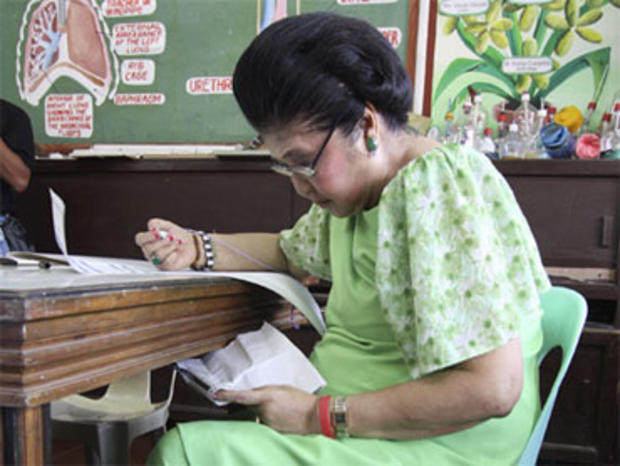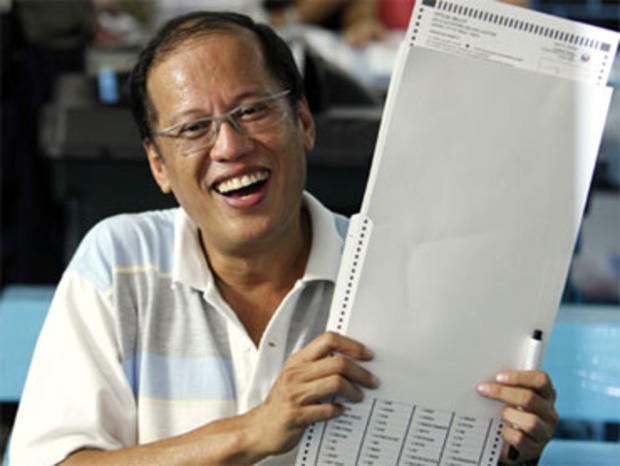Fame, Family Dominate Key Philippines Election
This story was filed by CBS News' Barnaby Lo in Manila.
At a recent campaign rally in Sarangani province in Southern Philippines, thousands of people gathered to see a superstar. But the superstar was not coming to endorse a politician, he was the aspiring politician. Manny Pacquiao, widely considered today as the world's best pound-for-pound boxer, is vying for a seat in the lower House.
"I have a mission. I want to help the people who need help," Pacquiao tells CBS News. "My program is to give them business, education, healthcare and medical assistance."
After more than four hours of waiting, Pacquiao's convoy -- lights blinking and sirens blowing - finally arrived. As he stepped out of his bullet-proof Hummer and made his way to the stage, members of the media and ecstatic fans swarmed around him.
It's a scene not uncommon during elections in the Philippines, and Pacquiao is not the only high profile candidate running in Monday's elections. As Filipinos headed to polls today, they had close to 80,000 candidates for more than 17,000 local and national posts to choose from, and out of that number, more than 100 are considered celebrities. Leading the surveys in the senatorial race are three former movie stars. Former President Joseph Estrada, also a movie star, who was ousted in 2001, convicted of graft and then pardoned by President Gloria Macapagal-Arroyo, is running for president again. And the president herself is running for Congress.
But even in a country where elections often seem to be more of a popularity contest, Pacquiao is in for an uphill battle against a member of a political clan that has long served his province. He lost his first Congressional bid in 2007 against a well-established politician.
"I wasn't prepared the last time. But this time I am prepared and I'm confident to win this election," said the boxer.
If there's one candidate in this election considered to be a shoe-in, it's the country's former first lady, Imelda Marcos (pictured above), known for her 3,000 pairs of shoes and lavish lifestyle. At 80, she is making a comeback in politics, running for Congress in the province of Ilocos Norte, her family's stronghold.
"Some are so happy to see me because they haven't heard from me for so many decades, they're just happy to see me," Marcos said.
In a wide-ranging interview with CBS News, Marcos talked about her plans to create a "paradise" - a self-sustaining community where "everything is there." She said that with satellites and the Internet, she can monitor communities "24-7." And in Congress, she will author laws that "will set the way of approaching problems totally and completely and for always."
"For me it's a movie that is growing, a movie that is enlightening, a movie that you are seeing that you can make paradise and heaven too, for these people, and make them happy and be living in peace. It's very enriching for me," Marcos said.
Despite her age, and not that the people of Ilocos Norte have forgotten who Marcos is, the senior politician has made it a point to visit villages far and near.
"If I was lazy, I could easily bring them all to town, have a superstar there singing and all of that. No, but I want to go to the rural areas and see for myself what is the problem," Marcos said.
The former first lady is not the only one in the family vying for a government post. Her daughter, Imee, is running against a cousin for governorship of Ilocos Norte; her son, Ferdinand Jr., is running for Senate and has consistently made it to the magic 12 in poll surveys.
Marcos believes her children have what it takes to get them back to the Palace, but she says that is for destiny to determine. What destiny seems to hold right now though, is another former president's son becoming the next Philippine president.
Sen. Benigno "Noynoy" Aquino III (at left), the only son of Ferdinand Marcos' nemesis Benigno Aquino Jr. and democracy icon and former president Corazon Aquino, is the presidential front-runner by a wide margin, several surveys show.
In a country where personality and patronage seem to be at the heart of politics, and where some families have rivaled each other for decades, nothing has shaped modern Philippine history more than the feud between the Marcos and Aquino clans.
The elder Benigno Aquino was one of the harshest critics of the late dictator Ferdinand Marcos, whose 20 years as president were marred by allegations of human rights violations and corruption. He was incarcerated then exiled to the United States with his family, and upon return to Manila, assassinated. The series of protests that followed eventually led to the ouster of Marcos through a popular peoples' uprising in 1986 and the rise of Corazon Aquino as president.
But Imelda Marcos is not afraid of an Aquino presidency, as she insists the allegedly ill-gotten Marcos wealth is rightfully theirs.
"I'll be glad for the Marcoses, because then there will be transparency, and they will know the truth about the Marcoses," she said.
Noynoy Aquino never manifested any desire, at least publicly, to run for higher office, as he has kept a relatively low profile in all 12 years of his political career. That was until the death of his mother in August last year, when an overwhelming outpouring of public sympathy and support urged him to consider running for president.
Since then, Aquino has consistently topped poll surveys, even as his closest rivals, Manny Villar, whose rags to riches story has served as the main theme of his campaign, and deposed President Joseph Estrada, who is still undeniably popular with the masses, have identified themselves with the poor. Almost a third of the Philippines population lives on less than $2 a day.
Often criticized for his lack of experience and a lackluster performance as a lawmaker, Aquino, much like his mother, has banked on his "clean image," campaigning on an anti-corruption platform.
"The fight is not yet over," Aquino told thousands of supporters at a campaign rally on Friday night, as the campaign period reached the home stretch. "The people are very hungry for a new leader."
Indeed, President Arroyo has the lowest approval rating of any Philippine president. She was installed as president when massive anti-corruption protests forced Estrada out of office, but after nine years in office, her administration has been hounded by perhaps even more corruption scandals. She not been seen on the campaign trail with her party's presidential pick Gilbert Teodoro, Jr., a Harvard-educated lawyer and former Defense Secretary.
But the fight Aquino was referring to last Friday wasn't just the fight against corruption, but also a fight to ensure that the country's first automated election becomes a success. A few days ago, a computer glitch in machines to be used to count votes triggered fears of a failure of elections and suspicions of election fraud.
This led some to call for a postponement of the elections, and some to call for a parallel manual count.
The Associated Press reports that even Aquino was unable to immediately cast his ballot Monday as vote-counting machines broke down. Elections officials extended voting for another hour to try and make up for delays.
Widespread vote fraud and violence have always plagued Philippine elections, the most striking example of which was the brutal murder of 57 civilians in Maguindanao province in the south late last year.
If these elections are deemed a failure, the possibility of even more widespread violence is not that far-fetched.

